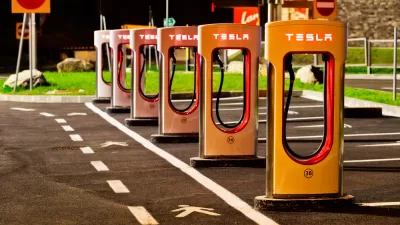All is not copacetic in the Bay Area's EV community. An apparent shortage of electric vehicle chargers is causing incidents where EV owners disregard proper 'charging etiquette' and unplug the charger from other EVs to charge their own vehicle.
"Unlike gas stations, charging stations are not yet in great supply, and that has led to sharp-elbowed competition," writes Matt Richtel, a Bits blog reporter for The New York Times. "Electric vehicle [EV] owners are unplugging one another’s cars, trading insults, and creating black markets and side deals to trade spots in corporate parking lots."

Credit: Clipper Creek: Electric Vehicle Charging Stations
Apparently some EV owners are not waiting for the lights on charging vehicles or the charging station to signal when a vehicle is finished charging, or there may be no such lights.
The thrust of Richtel's piece is that while a shortage of chargers that can be remedied by increasing the supply, but until then, charging behavior needs to be addressed
More public chargers are the obvious long-term solution. About half of the 330,000 electric vehicles [EVs] in this country are registered in California, and Gov. Jerry Brown wants to increase that number to 1.5 million by 2025. He has pledged a sharp increase in charging stations.
Richtel includes examples of charging rage in Silicon Valley that fortunately did not go past exchanging angry words.
Such incidents are not uncommon, according to interviews with drivers and electric vehicle advocates, as well as posts from people sharing frustrations on social media. Tensions over getting a spot are “growing and growing,” said Maureen Blanc, the director of Charge Across Town, a San Francisco nonprofit that works to spread the adoption of electric vehicles.
Developing Charging Etiquette
According to the EV Etiquette Survival Pack (available for sale from Etsy for $15.99, complete with hanging tags and charge notices):
Problems arise when all the chargers are taken, EV drivers forget to plug in or overstay in a space, non-plugin vehicles block spaces and when people don’t leave their contact information when they charge. Take Charge and Go has developed tools to help with communication between drivers and spread the word on how to effectively use and share public charging equipment.
"Right now, there is roughly one public charger for every 10 electric vehicles — about 15,000 in California, according to ChargePoint, one of the biggest charging-station companies," writes Richtel. "Some take half an hour for a charge and others four hours or more; many are free or subsidized, and others cost $1 an hour or more." [CNET describes the gamut of charging options.]
Alternative approach: charge for the parking and the charging
My neighbor in Burlingame, California tells me that the parking cost at the EV charging space at the local Caltrain station is higher than the fee to charge his Nissan Leaf. Consequently, he's reluctant to use it, preferring the free charging and, need I say, free parking at his office.
The reserved parking for EVs becomes somewhat similar to disabled drivers parking spaces One of the aforementioned survival notes reads: “EV charging spaces are functional reserve spaces, just like disabled drivers spaces.”
Ambitious goals to meet
In addition to the governor's aforementioned executive order, the California Air Resources Board (CARB) has a goal of having zero emission vehicles (ZEVs) comprise 15.4 percent of annual vehicle sales by 2025 [PDF]. In addition, it's chair, Mary Nichols, "wants 100 percent of the new vehicles sold to be zero- or almost-zero-emissions by 2030, in part through greater use of low-carbon fuels that she’s also promoting," as noted here earlier.
Too many perks?
Richtel ends on a provocative concept—that the problem may be stem not just of a shortage of chargers, but that all the special perks offered EV owners have influenced their behavior.
The EV charging "culture stems in part from the way electric car owners have grown used to perks, like getting state and federal subsidies for buying green cars, or permission to use the car pool lane," according to one executive where EV owners greatly outnumber chargers. "So when it comes to unplugging someone, well, they feel deserving."
FULL STORY: In California, Electric Cars Outpace Plugs, and Sparks Fly

Alabama: Trump Terminates Settlements for Black Communities Harmed By Raw Sewage
Trump deemed the landmark civil rights agreement “illegal DEI and environmental justice policy.”

Study: Maui’s Plan to Convert Vacation Rentals to Long-Term Housing Could Cause Nearly $1 Billion Economic Loss
The plan would reduce visitor accommodation by 25% resulting in 1,900 jobs lost.

Planetizen Federal Action Tracker
A weekly monitor of how Trump’s orders and actions are impacting planners and planning in America.

Waymo Gets Permission to Map SF’s Market Street
If allowed to operate on the traffic-restricted street, Waymo’s autonomous taxis would have a leg up over ride-hailing competitors — and counter the city’s efforts to grow bike and pedestrian on the thoroughfare.

Parklet Symposium Highlights the Success of Shared Spaces
Parklets got a boost during the Covid-19 pandemic, when the concept was translated to outdoor dining programs that offered restaurants a lifeline during the shutdown.

Federal Homelessness Agency Places Entire Staff on Leave
The U.S. Interagency Council on Homelessness is the only federal agency dedicated to preventing and ending homelessness.
Urban Design for Planners 1: Software Tools
This six-course series explores essential urban design concepts using open source software and equips planners with the tools they need to participate fully in the urban design process.
Planning for Universal Design
Learn the tools for implementing Universal Design in planning regulations.
Caltrans
Smith Gee Studio
Institute for Housing and Urban Development Studies (IHS)
City of Grandview
Harvard GSD Executive Education
Toledo-Lucas County Plan Commissions
Salt Lake City
NYU Wagner Graduate School of Public Service



























